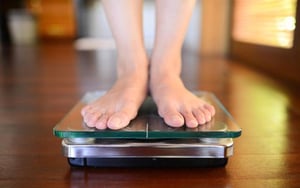 With age comes many things: greater wisdom; deeper empathy; a greater sense of knowing who you are; and the very real possibility of a bigger pants size. So, why does it take longer for women to lose weight, especially after 40?
With age comes many things: greater wisdom; deeper empathy; a greater sense of knowing who you are; and the very real possibility of a bigger pants size. So, why does it take longer for women to lose weight, especially after 40?
Sleep Deprivation
Whether due to the night-waking of young children or hot flashes from the onset of perimenopause, middle-age is when sleep quality goes downhill for many women. Lack of sleep has long been linked to an increased risk of obesity and diabetes, because it’s harder for the body to regulate glucose leading to something called insulin resistance, which can cause weight gain.
Men Are Bigger
If you're scratching your head wondering why your husband can lose 25 pounds in two months by making some simple lifestyle changes, here's why. Women naturally have a higher percentage of body fat and lower muscle mass than men do. Muscle is more metabolically active than fat is, it utilizes more energy in the form of calories. The average man is also just larger than the average woman, so it takes more calories to maintain a larger body mass. Between these two differences, men can consume more calories to maintain or lose weight than women can. Women have to consume fewer calories to maintain or lose weight.
Noteworthy: Will Cutting Out Sugar Help You Lose Weight
Noteworthy: The Simple Math Behind Weight Loss
Noteworthy: New Study: Reduction of Overall Body Fat Reduces Risk of Breast Cancer
Slower Metabolism
Estrogen levels begin to decline as a woman begins perimenopause. As a result, women lose muscle mass, and that loss results in a decrease in metabolism — women literally have to consume fewer calories to maintain or lose weight. The loss of estrogen also leads to a propensity to deposit fat in the mid-section, which leads to further metabolic derangement (or an inefficient metabolism). It increases insulin resistance, can lead to pre-diabetes and diabetes, and increases the risk for heart disease.
Less Muscle Mass
The loss of muscle mass mentioned above also decreases the number of calories women need to maintain or lose weight. Additionally, insulin resistance that results from fat deposition in the mid-section can also make losing weight more difficult. Insulin is a hormone. It makes us feel hungry and causes us to store the carbohydrate we eat as fat instead of using it for quick energy.

